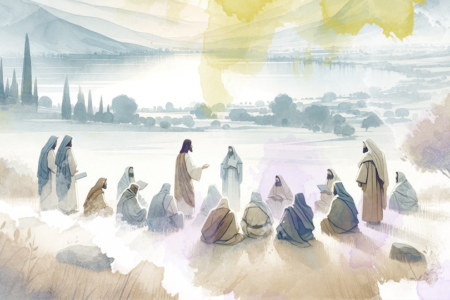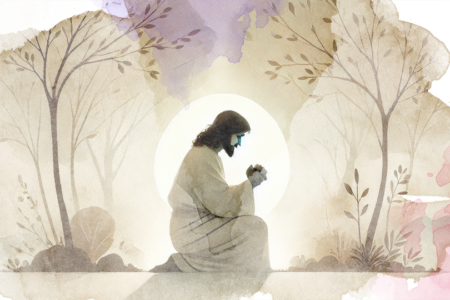Messiah: A Biblical Description
The Origin of “Messiah”
The term “Christian” means “one who is a follower of Christ or Messiah”. As the title “Messiah” or “Anointed One” is a Jewish term from the Hebrew Bible, it would seem logical for Christians and Jews to have some cause for agreement as to definition of Messiah’s role. As it happens, the classic statement of the Christian faith, the Apostles’ Creed, says of the Messiah, “He shall come to judge the quick and the dead.” The Jewish summary of faith, compiled by Rabbi Moses ben Maimon in the 12th century, says, “I believe with perfect faith in the coming of the Messiah, and, though he tarry, I will wait daily for his coming.”
The authoritative sources for the description of the Messiah and His work are the same for both Jew and Christian, and they are found in the Hebrew Bible. The earliest reference to a Champion, who would come to fight on behalf of mankind against man’s archenemy, Satan, is found in Genesis 3:15, where it is recorded that the seed of the woman would bruise the head of the serpent. A further reference to this “seed” is specifically linked to the ancestor of the Jewish people, Abraham, who is told, “And in thy seed shall all the nations of the earth be blessed . . . (Genesis 22:18).
A later reference in Genesis 49:10 to Shiloh , which the Jewish commentator Rashi identifies as meaning “Messiah the King”, says that “Shiloh” must come before “the sceptre . . . departs from Judah.” This loss of sovereignty can be traced to 586 B.C. with the Babylonian captivity, which began the “Times of the Gentiles” .
Great national leaders were seen as foreshadowing the Messiah, such as when Moses is told by God of the rise of a Prophet “like unto thee” (Deuteronomy 18:18). The psalmist calls the Messiah “a priest forever after the order of Melchizedek” (Psalm 110:4), and in Zechariah 6:12-13 the Messiah is called “a priest upon his throne.” King David is singled out as the ancestor of the Messiah (1 Chronicles 17:11, 12 and Isaiah 11:1, 2, 10), who will be born in David’s own birthplace (Micah 5:2).
THE ANOINTING OF ISRAEL’S LEADERS
All these references to the Messiah, under the figures of prophet, priest and king, lead quite naturally to a clearer understanding of the meaning of the Hebrew word “Mashiach” from which the word “Messiah” comes. Here we have the thought of anointing, which is a solemn ceremony of separation to the office of prophet, priest or king, marked by a symbolic application of oil to the one being anointed.
This concept of anointing opens up wide vistas for any consideration of the messianic role, especially when the anointing oil is seen as a symbol of the Holy Spirit. In Isaiah 61:1 the phrase. “The Spirit of the Lord God is upon me” is paralleled in the fashion of Hebrew poetry by the matching phrase, “the Lord hath anointed me.” In Luke 4:18 Jesus applies this passage to Himself.
The list of messianic verses, with Christian and Jewish Midrashic comments added, could be extended considerably; but enough passages have been given to show that there is a whole chain of Scripture verses which make up the Bible profile of the Messiah. It has been suggested that these verses circulated in ancient times in a systematized form for use among students of messianic prophecy. The skillful use of such figures as Moses, Melchizedek, David and others, together with many allusive and comparative statements about the Messiah, serve to give a well-rounded portrait of a figure who sums up all that has been best in the outstanding characters of Israel’s history. Those anointed by society for the high offices of prophet, priest and king are overshadowed, and even absorbed, by the One who is the “Anointed One” above all others, whose anointing is from God Himself (Isaiah 61:1).
So far, after noting a universal role for the Messiah in Genesis 22:18^ we have seen the development of a specifically Jewish hero-figure. His obvious function, like that of Moses and the priests and kings of Israel, would be to serve the God of Israel by watching over the people of Israel, to be the shepherd of God’s flock. But, in Daniel 7:13 we see “One like the Son of Man,” coming “with the clouds of heaven.” Thus, the pre-existence and heavenly origin of the Messiah is revealed.
THE MESSIAH IN THE NEW TESTAMENT
The New Testament continues this theme of an exalted Messiah, but with a very significant contrasting theme. Jesus, who is presented as the Messiah, has at His birth a combination of heavenly acclamation and human rejection. The angels sing His praises, but Herod would seek His life. Most of the earthly ministry of Jesus was conducted in a low key. Jesus is recognized as a messianic aspirant (Matthew 26:63). He is acknowledged as such by His disciples (Matthew 16:16). He claims messiahship personally (John 4:25, 26), and He even makes a public disclosure of His messianic role by His triumphal ride into Jerusalem (Matthew 21:1-11). But, the symbolism of His use of the unwarlike donkey, as predicted in Zechariah 9:9, is inescapable.
Jesus was not the Man the nationalists of Israel were looking for. He very carefully and deliberately disassociated Himself from any violent liberation movement. Caesar’s tax was to be paid (Matthew 22:17-21). “Drafting” for the office of liberator was to be resisted (John 6:15). Even arbitration on an inheritance was withheld (Luke 12:13, 14). Jesus did not refuse to liberate Israel. Rather, He indicated very clearly that the time for such liberation had not yet arrived. Every one of the many violent messianic movements, which have sought to establish the opposite view over the last two thousand years, have only served to underline the wisdom of His position.
VIEWS OF THE MESSIAH
Why have false messiahs like Theudas, Bar Kochba, Alroy, Abulafia, Molkho,Shabbatai Zvi, Jacob Frank and others been able to lead Jewish people to misery and death over the centuries? One obvious cause is a view of the Messiah such as that taught by Rabbi Moshe ben Maimon (Maimonides) in his work, Milkoth Melakim XI. 1-4. He states, “Do not suppose for a moment that King Messiah must perform signs and wonders, and create new things in the world, or restore the dead to life, and so on, according to some foolish folk s opinion. It is not so.” He then mentions that “Rabbi Akiba was the greatest scholar of all the scholars of the Mishna, and he was (as we may say) armour bearer to King Ben Cosiba, and he used to say of him that he was King Messiah, and he (Rabbi AJdba) and all the scholars of his time thought that this was so — until he was slain in (his) sins. When he was slain, it was known that he was not (Messiah).”
A crude pragmatism begins to emerge here, and the absence of biblical criteria for recognizing the Messiah throws light on the tragic trial and error method of post-Christian rabbinic messianism. This is clearly revealed as he goes on “. . . behold it is of a certainty that he is Messiah, if he prospers in all he does and conquers all the peoples that are round about him, and builds the Sanctuary in its place, and gathers together the outcasts of Israel. Lo, he is of a certainty Messiah. But if he is not successful up to this stage, or is slain, it is clear that it is not he who is promised in the Law.”1
Where a belief in a personal Messiah survives today in Jewish circles, it would probably fall Into this rather pragmatic category, where the Messiah is seen only as an agent of Israel’s warfare. He only incidentally rules over the rest of the world, because the pacifying of the Gentiles is seen as an essential prerequisite for Israel’s security. In fact, Maimonides specifically disclaims any aspirations on the part of the Messiah to “create new things in the world” (ibid). This is already a reduced view of messiahship.
This “ethnic” aspect of messiahship, as it relates to Israel, although it is a genuine feature of the messianic role, has for Maimonides eclipsed the universal aspect. We are faced with what looks like a “peace in the ghetto” aim. This may be a realistic aspiration for a medieval Jew, and it might fit in well with a folk religion which addresses itself to a mere tribal deity; but it is not the messianic vision of the Hebrew Bible. Neither does it do justice to a considerable range of early rabbinic teaching and speculation on the subject.
But perhaps the biggest problem of the reduced view of the Messiah is that of reconciling it with the Bible teaching that the God of Abraham is the only true God. If there is only one God, then there is no other deity to whom mankind can look for guidance and help. Also, if Messiah is divinely anointed, as the prophets teach, He is at least the agent of the universal God, who must make plans for the whole of mankind since they are His responsibility. Seen in this light, nothing less than the universal messianic vision of the Messiah will suffice.
As all of mankind is sinful and under attack by Satan, all of mankind needs a Champion, as in Genesis 3:15. As Abraham and his posterity are to be the channels through which God’s deliverance will come (Genesis 22:18), then the Messiah of Israel must necessarily also be the Champion of all mankind. This is an embarrassingly ambitious doctrine for an oppressed Jewish minority to hold. The reduced view held by so many in traditional Judaism has led to the acceptance of the many false messiahs who tried, unsuccessfully, to meet the admittedly modest requirements in the program outlined by Malmonides. It seems that messiahship is like the steel bow in the legend. Only one arm can bend it, and therefore its use is denied to lesser Men.
JESUS, THE SAVIOUR OF THE WORLD
But when we turn again to discover what the attitude was of Jesus to the messianic role, and to consider the way the early Christians visualized the Messiah’s task, many questions arise. It is obvious from what has been quoted that Jesus was no simple Jewish nationalistic zealot, hurling Himself against the might of Imperial Rome. But when we examine the New Testament accounts, we can detect a distinct nationalistic element. In John’s Gospel we find Nathanael hailing Jesus as the “King of Israel” (John 1:49). In Matthew 2:2, Jesus is referred to as the “King of the Jews”, and this is the title under which He died (Mark 15:26). In Luke’s history of the early Church, we find the disciples of Jesus asking, “Lord, wilt thou at this time restore again the kingdom to Israel?” (Acts 1:6). The answer is far from a denial. Rather, it is a redirection of interest toward the worldwide mission (Acts 1:7-8), but without any suggestion that Israel’s national future has been abandoned.
What, then, is the distinctively Christian view of the messianic role? Perhaps one most telling phrases in this connection is found, significantly, in the response of certain Samaritans to the teaching of Jesus. His first contact with this particular village group was through a woman who, herself, introduced the subject of the Messiah (Jotm 4:25). But when her neighbors joined the discussion, they were eventually moved to acclaim Jesus as “indeed the Christ (Messiah), the Saviour of the world” (John 4:42). Here is the principle of universal outreach, which is referred to by Jesus when He speaks of “other sheep” that He “must bring” (John 10: 16), Also, the universal commission, found in Matthew’s Gospel at the end of a very Jewish book, said by Papias to have been written originally in Hebrew, is very specific in directing the messengers of the Messiah to “all nations” (Matthew 28:19).
Obviously, the central theme of the messianic message to “all nations” could not be restricted to the political deliverance of Judea, as in Maimonides outline. The universal themes of forgiveness, peace with God and the life to come would have to loom large in any universal presentation, and we find that these themes, appropriate to the “Saviour of the world”, are the burden of the good news brought to the world by the early Christian evangelists (cf Acts 2:38-40; 17:22-31).
JESUS, THE LIBERATOR OF ISRAEL
But what is to prevent the Saviour of the world from also being the Messiah of Israel? Why should a person who refuses to liberate Israel, at what history has shown to be the wrong time, be precluded from bringing redemption to Israel at the appropriate time? But do the teachings of Jesus and His early followers show any lasting interest in the national welfare of the Jewish people? Strangely enough, in a passage which speaks of the impending doom of the Jewish state, Jesus includes the phrase, “Ye shall not see me henceforth, till ye shall say, Blessed is he that cometh in the name of the Lord” (Matthew 23:37-39). When it is remembered that Jesus wept over the city of Jerusalem (Luke 19:41), this statement cannot be seen as an expression of mere pique. Here is a genuine gleam of hope for the future, which is taken up by Paul. In his letter to the Roman Christians, Paul taught his Gentile converts to love and respect the Jewish people as privileged (Romans 3:2), chosen (Romans 11:2), and beloved (Romans 11:28). He then goes on to predict that “all Israel shall be saved” (Romans 11:26), and that their “receiving” will mean life from the dead” for the whole world (Romans 11:15).
As the position stands in the New Testament, the specifically Jewish aspect of the Messiah’s role has not been superseded or swallowed up, but rather is held in reserve against the future consummation of the Messiah’s work. The Messiah has already, in His first coming, started the process whereby man is delivered from the guilt and power of sin and is incorporated into the community of the new covenant (Matthew 26:28). The final judgment and renewal of the world is mercifully held in abeyance, while this work of rescue or salvation is going on (2 Peter 3:9). But at the set time, the Messiah will come in triumph “in the clouds of heaven” (Mark 14:61-62), “and every eye shall see him, and they also which pierced him (Rev. 1:7). This refers to the Jewish people, and the allusion to Zechariah 12:10 in this verse enables us to add, “. . . they shall mourn for him, as one mourneth for his only son . ..” This also establishes the deity of the Messiah, because at this time it is “the Lord ” who goes forth, and it is “His feet” that shall stand in that day upon the Mount of Olives” (Zechariah 14:3-4). This national reversal of Israel’s rejection of Jesus is also seen in Paul’s quotation of Isaiah 59:20, when he states in Romans 11:26, “There shall come out of Sion the Deliverer, and shall turn away ungodliness from Jacob.”
The modem return and reconstitution of the nation of Israel, in the land of Israel, can thus be seen as a preparation for this great confrontation with the Messiah. These are the earlier stages of the process described in Ezekiel 37:7-8, where the dry bones of Israel are gathered and joined together and given flesh. The mighty national transformation of renewal in the Messiah, which will inevitably follow, corresponds to izekiel s reference to the life-giving inrush of the breath, or “Ruach , which will cause the whole house of Israel to stand “upon their feet, an exceeding great army” (Ezekiel 37:10).
Conclusion
In our comparison of the rabbinic and Christian concepts of the Messiah, we have seen Judaism groping after a merely human Messiah, who will try to meet their requirements but will never be big enough for the task he attempts. On the other hand, we sometimes see Christendom exalting a “de-Judaized” Messiah, who could easily be mistaken for a cosmopolitan master-philosopher, who operates in a cyclic world system which goes on forever. The New Testament, however, takes up both the universal and the Jewish aspects of messiahship, offering a Saviour of the world who is a Jewish Saviour, who is also concerned to enter into the enjoyment of His ancient title, “The King of the Jews” (Matthew 2:2).
ENDNOTE
- A Lukyn Williams, The Doctrines of Modem Judaism Considered (London:SPCK, 1939), pp. 152-155.






